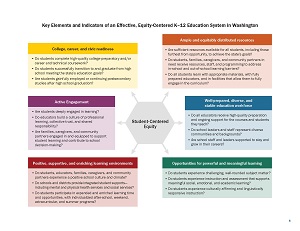Staff Contacts
The State Board of Education is responsible for implementing a standards-based accountability framework that creates a unified system of increasing levels of support for schools in order to improve student achievement (RCW 28A.305.130).
The Washington State Board of Education has begun to explore options for a more equitable and informative continuous improvement and recognition system. Key considerations include a desire to capture more robust metrics that address inputs, outputs, and outcomes aligned to the state goals for basic education. The SBE is just now completing Phase I of this work in conjunction with the Office of the Superintendent of Public Instruction, the Educational Opportunity Gap Oversight and Accountability Committee, and the Learning Policy Institute.
Re-envisioning a More Equitable Continuous Improvement and Recognition System
Washington’s goals for basic education are defined in statute RCW 28A.150.210 and are reflected in the forthcoming Profile of a Graduate. To meet these goals, the new system will consist of:
- A proposed re-envisioned continuous improvement and recognition system that will result in information that supports both continuous improvement and meaningful, empowering, and relevant learning experiences for all students, each day. This system will be built through significant input from stakeholders across the state.
- A reciprocal accountability system that will more accurately distribute accountability across the many K–12 policymakers and leaders at the state and local levels, and support processes in which indicators of opportunities as well as outcomes are used in schools, districts, and system wide to inform policy, programs, practices, and partnerships.
The state currently collects a wide variety of data about its education system, some of which are used for federal accountability, the state’s report card, the Education Research and Data Center, and the state’s Annual Data Book. The potential indicators proposed below can leverage already collected data and may also provide the state with an opportunity to pilot innovative approaches, such as through a school climate and culture survey that can help the state better understand all students’ opportunity to learn. Additionally, to ensure equity remains at the forefront of continuous improvement, indicators’ metrics should be capable of being disaggregated by subgroups to the greatest extent possible.
Additional Resources
- School Climate and Conditions for Learning (LPI Brief)
- Re-envisioning Continuous Improvement and Recognition Systems (LPI Summary Report)
- Accountability, Recognition, and Improvement Practices for Washington


